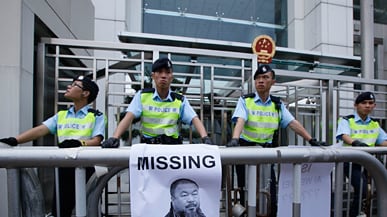A “ Free Ai Weiwei” street art campaign has sprung up in Hong Kong, as outrage grows in the international art community over the Chinese dissident artist’s continuing detention. In recent days the glass doors of several upscale art galleries in Hong Kong’s Hollywood Road area displayed photos of Ai with the single word “Missing” in bold black letters. Graffiti artists have also taken up the cause. A hand-painted caricature of the detained artist with the caption “Free AWW” appeared on Shing Wong street and elsewhere. Stenciled likenesses of Ai with the words “Who’s Afraid of Ai Weiwei” appeared on pedestrian overpasses in heavily trafficked areas as well.

Hong Kong authorities said they would investigate the stencilings, which could lead to charges of criminal damage that carry a maximum penalty of 10 years in prison. The student artist—herself now a fugitive who dares not have her name published—told Hong Kong’s South China Morning Post: “It will be worth it if just one person sees what I've done and asks themselves: `Why should Ai Weiwei be silenced?'"
A former British colony, Hong Kong reverted to Chinese sovereignty in 1997 but was promised continuing political and administrative autonomy. As a result the enclave, adjoining the mainland’s Guangdong province, is the freest city in China. (On the Chinese mainland Ai’s supporters might be scathingly critical of the government in private off-the-record conversation but public displays of protest over Ai’s detention are likely to trigger the same sort of heavy-handedness that befell Ai himself.)
Despite Hong Kong’s unique political niche, critics contend that its political feistiness vis a vis Beijing has eroded since 1997. Public individuals or media which prominently and consistently criticize Beijing policies—especially on touchy subjects such as human rights, democracy, and freedom of expression—might find advertisers pulling out or relatives’ businesses being threatened. So the grassroots street campaign to “Free Ai Weiwei” is significant; Hong Kong is the only place in China where even a hint of anti-government dissatisfaction is emerging in public.
Public individuals or media which prominently and consistently criticize Beijing policies might find advertisers pulling out or relatives’ businesses being threatened.
In the West meanwhile, prestigious art institutions are rallying behind Ai. An online petition calling for his release is supported by the Guggenheim and Museum of Modern Art in New York, as well as the Tate Modern in London and the Association of Art Museum Directors. (Ai recently held his “ Sunflower Seeds” exhibition at the Tate Modern.)

But the Beijing regime’s supporters are hitting back. The social action platform that sponsored the petition, Change.org became the victim on April 19 of what it says was a sustained “denial of service” cyberattack originating in China. Before the cyberassault, the petition had achieved “viral success” and had been signed by some 94,000 people in 175 countries, according to its organizers. “We do not know the reason or exact source of these attacks,” said Change.org founder Ben Rattray in a statement, but after the “unprecedented success of a campaign by leading global art museums using our platform to call on the Chinese government to release Ai Weiwei, we became the victims of highly sophisticated denial of service attacks from locations in China.”
Ai is under suspicion of having committed unspecified “economic crimes,” according to a foreign ministry spokesperson. His wife Lu Qing was questioned about the couple’s taxes. Not long ago Wen Wei Po, a Hong Kong newspaper with close Beijing ties, reported that Ai’s suspected crimes include tax evasion, destroying evidence that might have been used against him, and distributing pornography. Lu Qing denied the accusations and maintains Ai was detained for his outspoken political views. She says the last charge might be related to a semi-nude self-portrait Ai had posted online, apparently to make fun of China’s notorious Internet censors.
Melinda Liu is Bejiing Bureau Chief for Newsweek and The Daily Beast, a veteran foreign correspondent, and recipient of a number of awards including the 2006 Shorenstein Journalism Award acknowledging her reporting on Asia.






